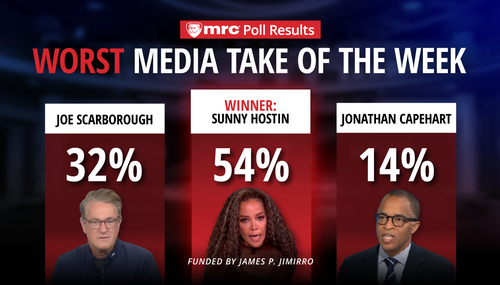
Sanneh began by insisting that the Wright issue is being overblown, because there were radical things that Martin Luther King said that "would generate enormous controversy today." (Brent Bozell touched on that, the 1967 King speech at Riverside Church alleging both white and black American soldiers were brutalizing Vietnamese civilians.) But Rose was tough enough to respond: "But I want to know what that [King speech] was that’s equivalent to saying AIDS is a government conspiracy to kill black children?"
Sanneh, who’s now with The New Yorker magazine, where he’s written an article on Wright and his church, began spinning: "Well, two things. One is, I think the AIDS comment is interesting because it’s really a small part. It’s not as if he wrote books about this. This is something that was kind of buried in one of his speeches. Yo won’t find it in any of his books. And that’s not really what he is about."
Rose didn’t press back: but he just told everyone at the National Press Club that he wasn’t backing down from that wacky and insulting conspiracy theory. Sanneh said Wright and Obama weren’t so far apart, they just had a difference in emphasis, one was pessimistic and one was optimistic. "In other words, the pastor was emphasizing the problems in American history and Obama was trying to demonstrate the promise in American history. And so long as it was only a difference in emphasis, the two could sort of uneasily coexist, and Obama can say I have a difference of emphasis with my pastor. I’m a more optimistic person, but you know, we agree fundamentally."
Sanneh did acknowledge that Obama had to distance himself because "Wright came out and kind of doubled down on some of the statements he made about government having created AIDS and some of the other things that are really not part of his core theology, but things that he may otherwise believe."
But he kept insisting that there was no spectacle to watch, that people should just stop looking at the train wreck, because there is no train wreck. There was no yawning gap between Wright and Obama, just the media taking the whole thing out of context.
SANNEH: I think the differences weren’t all that fundamental. When you go back and look at Reverend Wright’s old speeches, when you go back and read his books, there’s not much in there that’s hugely controversial. His message is largely a message of – it’s a Biblical message, first of all. It comes out of black liberation theology. But it’s really a message where he sticks very closely to the Scripture.
And when he gets political, he’s often talking about South Africa, he’s talking about racism in America. Again, he’s emphasizing different things than Obama would, but he’s not making wildly controversial statements, by and large.
Rose then pressed Sanneh that "we don’t excuse somebody who is really a nice person and lives a good Christian life if they are a white racist. They make racist statements and they lose their job in the Senate or in other places." As he tried to edge into the idea that a black who makes inflammatory statements against whites should also be condemned, Sanneh protested.
SANNEH: It’s important that we not treat these things as symmetrical. It’s important that we not treat black and white as symmetrical, it’s important that we not –
ROSE: Exactly.
SANNEH: – treat white racism and "black racism" as symmetrical, so that’s one thing.
ROSE: And explain that, because that’s a very good point.
SANNEH: Well, the issue – I think people haven’t really defined when they talk about "anti-white racism" in Reverend Wright’s church, they have talked about what they would mean...I think those traditions and communities ar enot in any way symmetrical.
ROSE: And in fact, it’s also different as you would say, and not asymmetrical, to say when people use race to try to dominate and deny, and other people who look at race and say this is the reason we’ve been victimized.
SANNEH: Right, and obviously part of race is also part of the problem that Obama faces. In other words, there is a certain subtext to the Obama-Wright controversy where people kind of want to make sure he’s not too black or not the wrong kind of black, or not something related to something in the black community that makes them uncomfortable. And you don’t find these pressure when obviously it’s a white politician and a white pastor.
ROSE: Right.
SANNEH: I think – I do think, you know, having spent some time kind of trying to study what Reverend Wright does, I do think that his comments about AIDS are kind of a red herring here. And that doesn’t mean that people shouldn’t speak out against them, but what I mean to say, through all the speeches, I do find one – you know, there is that famous reference that became the YouTube clip. But unless I’m missing something, I didn’t find any references to it in his books.
And I suspect that many congregants at the Trinity United Church of Christ probably didn’t necessarily know how he felt about that. In other words, it wasn’t a cornerstone of his teaching.
This is the kind of spin that should send Wright’s critics to his book page on Amazon.




